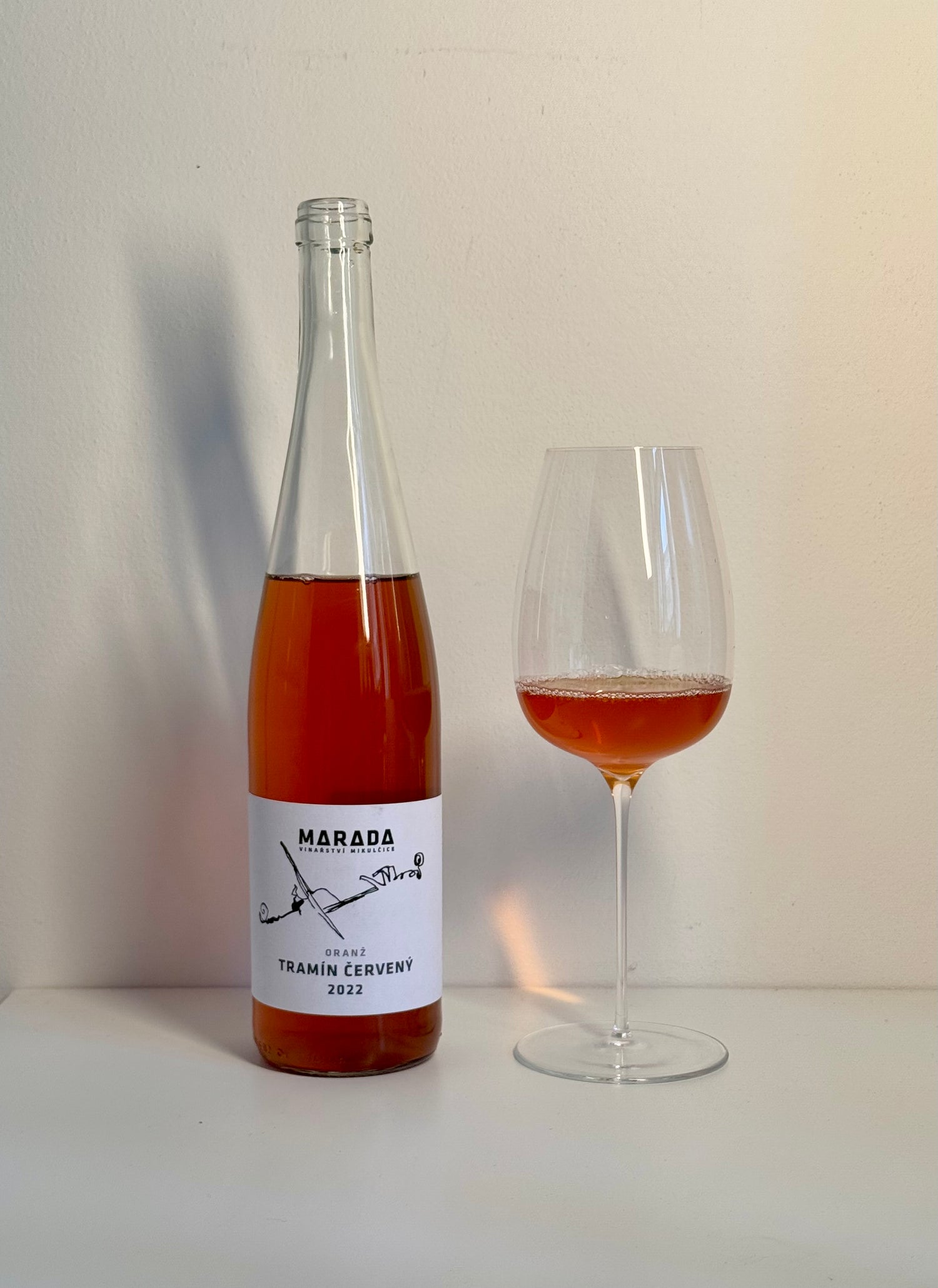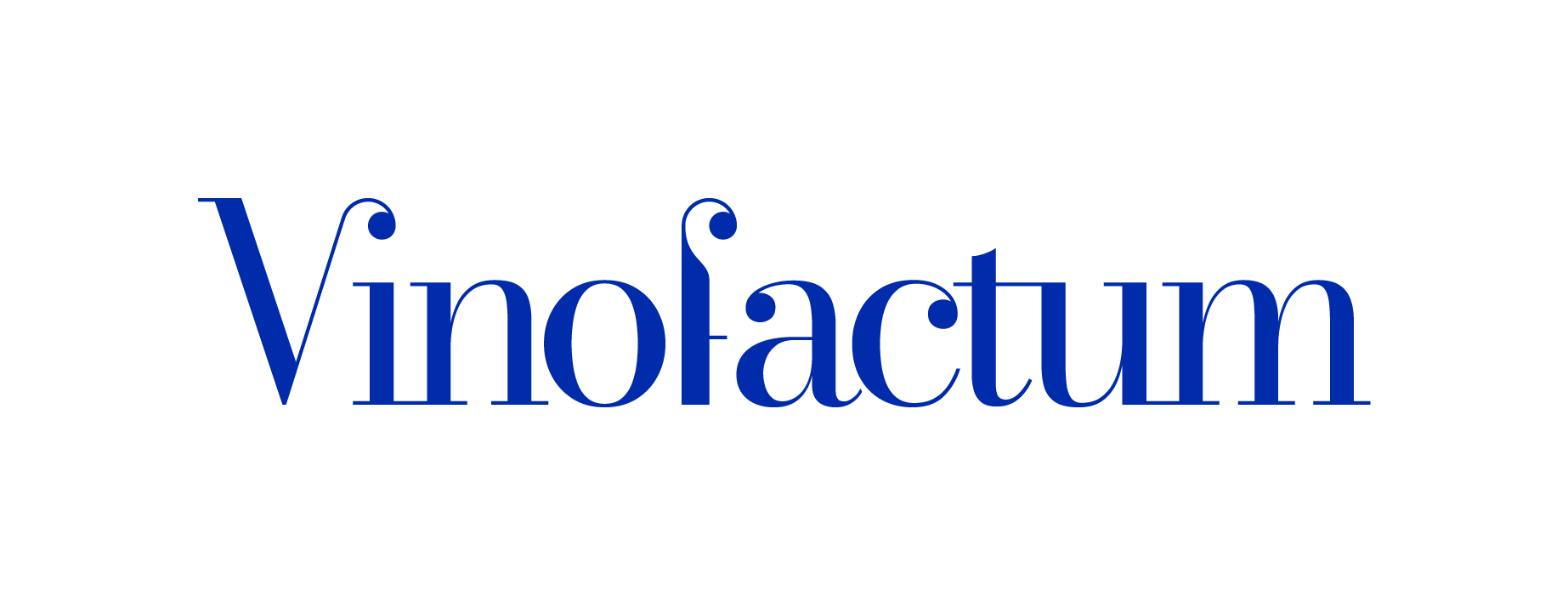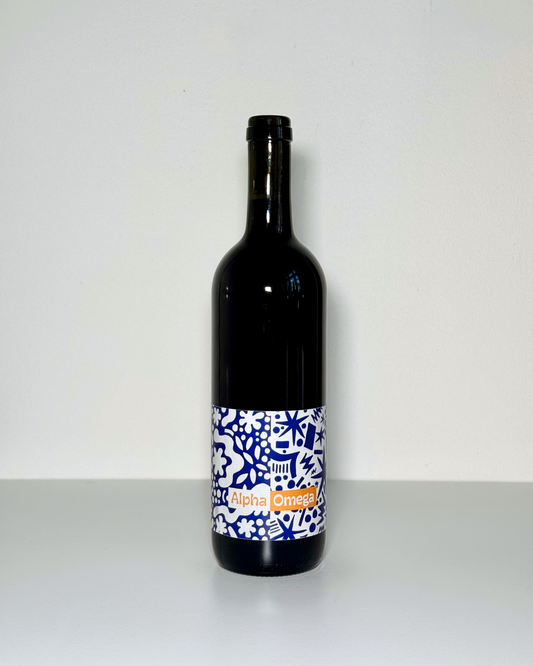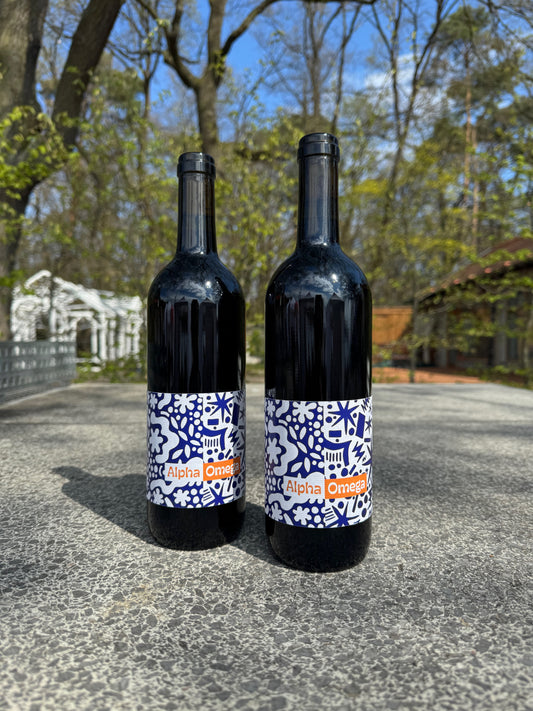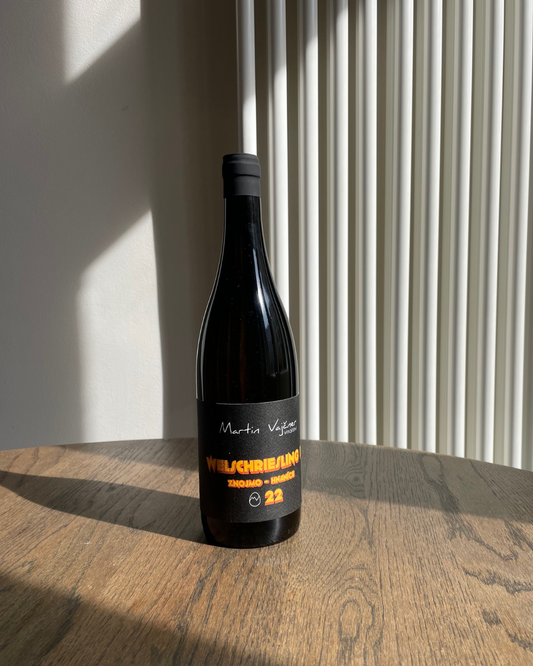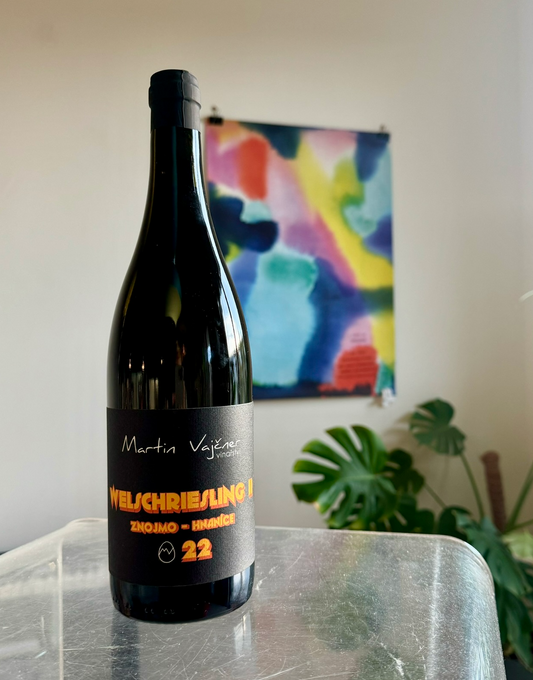Surk-ki Schrade knew early on in her wine journey that it was natural wine or nothing at all. Since that discovery, 16+ eventful years have passed, and Surk-ki has been relentless in her mission to share natural wine with as many people as possible. She founded Germany’s first natural wine shop, La Vincaillerie, in 2009 and has organized Weinsalon Natürel annually since 2015.
For this month’s installment of VinoFrau, we sat down with Surk-ki to find out what keeps her motivated after all these years – or if she plans on stopping anytime soon.
Interview by Lauren Johnson-Wünscher, Berlin-based wine and food writer / Images courtesy of Surk-ki Schrade
How did you get your start in the wine industry?
I was an Assistant Director in the film industry, and a casual wine drinker. I tasted my first natural wines at a natural wine fair in Marseille in 2008. My own market research in Germany revealed that they didn't exist here. So I started importing and selling them myself, founding La Vincaillerie. That was in 2009. It was driven by my decision to drink only fermented grape juice [without any additives] and the fact that I could not find it in Germany, not because I wanted to be in the wine industry.
Can you set the stage for us and describe what it was like to open a natural wine shop in 2009? Who was shopping with you? What was the reception and reaction like?
Well, everyone said I was a bit crazy. I had no idea about wine. But the fact that I now had the choice of drinking a pure fermented grape juice or an unknown cocktail [of wine additives] really encouraged me. After this first wine fair in 2008, I already had connections to wineries in the south of France, and I made my first order. On my first pallet, I had Domaine du Mazel, Le Raisin et l’Ange (Gilles Azzoni), Le Temps des Cerises (Axel Prüfer), Andrea Calek, Yannick Pelletier, and 2 more from Côte du Rhône and Gaillac. I started with around 16 different wines. I had nearly no white wine, because I didn’t like it at that time. Today, I still choose the selection in my shop and buy the wines myself. I have no employees.
Initially, I only worked with wine tastings [to grow my business]. I was aware that the flavor could be different. At that time, there weren't that many wineries in the natural wine sector, and it was important to me that people first try it, understand what they have in their glass, and then buy it out of conviction. Back then, I collected all the email addresses I had and wrote to people. At the time, my wine tastings were no-registration, no fixed price, on a donation basis. Anyone could just come into the shop at a certain time and try something. Wine experts also came, shook their heads, and didn't understand what I was doing. They said things like, “Oenology says wine is not stable without the addition of sulfur,” and that I had it wrong. I had to listen to a lot of strange things. Since 2014, I have had set opening hours and an online shop.
Then, as now, I can name one thing my customers have in common: Curiosity.
Did I hear right that you didn’t have opening hours before?
I have two sons, and at that time, they were still very young. I live next door to the shop and I didn’t want to stay there and leave my kids alone. I told people to call me if they wanted to buy a bottle. The wine hotline of Cologne was born and still lives on.

Is there anything that still surprises you about the wine industry?
It still amazes me that many people allow themselves to be told by very few people what they should taste, what is good for them, and what is not. I think everyone can decide for themselves. Not only in wine, but in everything we consume.
When I started, I went around the specialist retailers in Cologne and asked for natural wine, for wines without additives. I was sometimes shouted at. I now forgive my colleagues, because I was probably the first person in their careers to ask such a question. I was told that if one of Germany's best-known wine critics was to write something about my portfolio of wines, then business would certainly pick up. I did some research and came across a few well-known personalities. I read through their wine descriptions and couldn't do anything with them.
I researched further in the "normal" wine world and realized that I didn't understand the rules that apply there; rankings, points, terms like “high-quality”. I didn't want to play along with them, so I used my natural wine colleagues from France as an example and made my own way, my own wine world, with its own rules and principles. Why should I like a wine another person likes, which I don’t even know? As a wine seller, why should I tell somebody what they have to like? That made no sense to me at all.
In the natural wine scene in France at that time, there was nearly no consensus. It was more of a sense of togetherness between all of us [where we were working together to] try to push an idea, a big project, which concerned all of us. At the natural wine fairs, wineries let you taste, and if you liked the wine, they would be happy and then send you over to their neighboring winemakers and say, “Try them, they’re a good colleague or friend, his wines are also good!”. In the "normal" wine industry, the only rule is to be better than your neighbor. I have chosen my way of communication in this society: transparency and honesty.
What keeps you engaged in the industry after all this time?
Good question, and one I ask myself all the time. In the first few years, I always wanted to close the shop. You have to admit to yourself when you're in the wrong place at the wrong time with the wrong product. I never pushed my business, I never took out a loan, I never wanted to flood the whole of Germany with natural wine. I always wanted to grow solidly and naturally. I call myself more of a businesswoman - I'm not a businessman in that sense. People sometimes criticise me for that, but I can't help it.
The natural wine world has changed a lot in 16 years, and it's always important to reposition yourself. When I celebrated my 10th anniversary, I said to myself, ‘I wanted to bring natural wine to Germany - it's done - and now?’ I decided to carry on. The wine tastings, my brick-and-mortar shop, and my aperitifs (always on Thursdays), the analogue contact with people, the conversations about consciousness in consumption, about life, politics, and philosophy have become an indescribable wealth in my life.
In the last few years, however, things have become tighter, as there are many new traders on the natural wine market who tend to follow the rules of the conventional wine world, so I have to reposition myself again. They start to speak about the different tastes of natural wine and make up a definition. For me, and I cannot stop repeating it, natural wine is only a question of wine production. The fact that it tastes different is just a consequence of this. So the definition is very technical and clear. You can compare Vin Méthode Nature, Vins Naturels Suisse, PVN, Vinnatur, Naturknall; it’s almost the same definition in every European natural wine association you will find, so there's no need to invent it again.
And what's this definition?
-
Organic farming (with or without certification, as far as I am concerned)
-
Hand harvested
-
Nothing added – only natural yeast…
-
Nothing removed
-
And if the wineries need it, maybe some SO2 added before or after bottling (amount of total SO2 max 30 mg/L)
I also continue because I see myself as having a certain responsibility towards the wineries, which I take seriously, especially in these difficult times. I have organized the Weinsalon Natürel [Surk-ki’s natural wine fair in Cologne, happening during the same weekend as the larger Prowein fair] since 2015. And natural wine is still in its infancy - we are still doing pioneering work, so it's worth continuing.

At one point, around 2018, when natural wine seemed to have more widespread exposure, it felt like it was billed as trendy. How did that make you feel, as someone who had been working with natural wine for a while?
In 2019, natural wine began to gain widespread popularity throughout Germany. Then came Covid, and during that time, the online shops for natural wine sprang up like mushrooms. For me, it was due to various factors for Germany: suddenly, there were German wineries, young people making natural wine, talking about it on social media, and making it much more public. People like Marto, GlowGlow, Bergkloster, and Andi Weigand, for example. There were Action Bronson videos with Clovis Ochin ‘eat and drink in Paris’ - that made a lot of people curious. Covid made some people think about their body, their health, and what they consume. And some of them informed themselves about wine production and found natural wine.
And throughout that time, my 5-8 colleagues and I were there and ready, as we had already been working with natural wine in Germany for a while.
Where is the largest percentage of your wine selection from, and why?
I started with wines from the south of France, and as I grew up there and was socialized there, it’s a bit of my home. If I were a wine, I'd be a Grenache from clay-limestone soil ;) The price range of a lot of wines from Ardèche and Languedoc-Roussillon is still good for young people – I still have wines in my shop for 12 – 14 Euros. That’s really hard to find in other countries. But I also have wines from Germany, Austria, Italy, Spain, and Greece.
The largest percentage of wines is also in the 0/0 [bracket]– so pure fermented grape juice WITHOUT added sulfur. So maybe around 2% of my wines have a little sulfur added at bottling – I will openly share [the amount] because I know why and how much. For me, transparency is an important part of the definition of natural wine. The choice of 0/0 came in the first years of the wine fairs I visited. I always asked to be left alone with my sip of wine in my glass. I tasted, made some notes with stars, hearts, or not, and asked after this what it was – doing this for a few years made me buy the wines with a lot of stars and hearts – and those were always the non-sulfured ones. So people call me the sulfur police and say I’m dogmatic – I’m not. I just ask and buy what I like most for my shop.
What misconception about natural wine would you like to clear up?
First of all, if you speak about natural wine, give your definition and check if your conversation partner has the same. Orange wine is not a natural wine. Natural wine is not an orange wine. An orange wine can be a natural wine, and a natural wine can be an orange wine. Both definitions have nothing to do with each other.
I’ve defined natural wine, and for orange wine it’s the following: a wine made out of white grapes, not pressed directly, grapes go in maceration, skins in the juice, like you do for red wine.
Also, you cannot speak about THE taste of natural wine. It’s like going into a big wine shop and asking, “What does wine taste like?” There is not ONE taste of wine in conventional wines. Natural wine shows even MORE possible wine flavours than conventional wines. The only taste we cannot describe is wine with residual sugar, as all natural wines are fermented until no sugar is left. (Of course, there are some exceptions, but only very few.)

What wows you about a wine – perhaps share one that has really impressed you lately?
It’s always magic – you can have such a big emotion with a glass of wine. I don’t think another drink can do this. You can open doors in your memory and feel like you’re in your grandma’s kitchen when you were a child, or on a summer holiday in a shady pine forest while it’s 35 degrees [Celsius] outside.
Or you can see wines like good friends. My range is a very good company – I can choose if I need a hug, or a very good friend telling me the truth about me I don’t want to hear; or I might just need somebody to take me home from a party – every wine is a different character and can help to make your life better, if you choose the right one for the right moment. That, of course, means you have to know what you need to be happy.
Those are the discussions I have in my shop when selling wine, and sometimes, in order to help I really need to ask questions about the moment, the location, the people. Where will the wine go, and what does the customer expect from it?
Can you compare the Köln wine scene with another city? (Either one that is very similar or very different, just for illustration purposes to help give readers an idea of what it’s like)
Cologne is a unique city - the people there have a way about them. They don't like fake. They don’t play the same game as Düsseldorf or Berlin. That’s why I feel quite good here. But yes, they like to drink Kölsch (the beer from Cologne), and the wine scene is growing slowly. That’s also due to the gastronomy in Cologne. Just drive 30 minutes to Düsseldorf and you will find a totally different restaurant scene; more experimenting, more natural wines on the wine lists. I think price is the reason here. As Cologne is a carnival city with “trink noch ene mit” – [just have one more drink with us] – the conviviality is more important and less expensive than the hype. A colleague from Berlin told me he stocks no wines under 20€ because people would think it’s not good enough for them. In Cologne, however, it’s the opposite. We need more wine to share ;)
Now, after 16 years in, I’m accepted and known.

Envision your ideal wine industry 10 years from now. Can you describe what that would look like?
We gave a talk at a wine fair in Angers this past February about ‘Have women already conquered the wine market?’ with Pascaline Lepeltier, Mylène Bru, organized by Viti F.
My objection was direct: I don't have to conquer it, I'm already in it and have created my place.
And I wish that not only for all women, but for all people who are interested in wine. We can change the old rules of the game that still prevail in the traditional wine world together. These rules were mainly made by men for economic reasons. We need more transparency and honesty, a new definition of ‘good wine’ - one that looks more at how it was made, how the grapes were treated in the vineyard.
To achieve this, we can all become better and more self-aware. This requires a little knowledge and some orientation, which I tried to summarize in my book Natürlich Wein from 2021.
I also hope that more agricultural land in Europe will be used for organic farming (currently at around 11-12%), that small wineries will be able to make a living from selling their wines again, that pricing will show more respect for labour, and that there can no longer be 3.69€ wines. Drinking less but ‘better’ is also healthier.
And yes, hectoliters of cheap wine have already been destroyed because too much was produced. The climate is going crazy. People have a "no alcohol" policy right now. We have wars in the world, and the wine market is not having an easy time at all at the moment. Some wineries may not make it if they hold on to the old ways. Realistic forecasts for the future are not easy [to hear]. But playing through different scenarios, including those that bring less money but perhaps more stability, is always worthwhile.
I don’t know if I will still be here in 10 years. I will be 65 years old then. I’m already looking for someone who wants to continue my Vincaillerie… hello, is there someone out there? Contact me!
